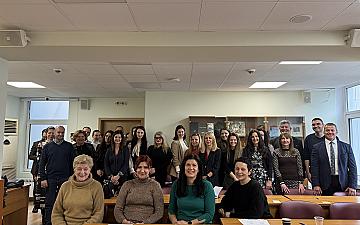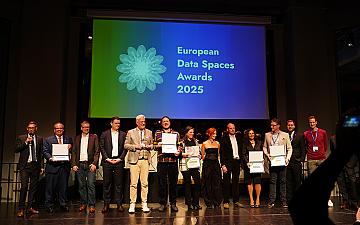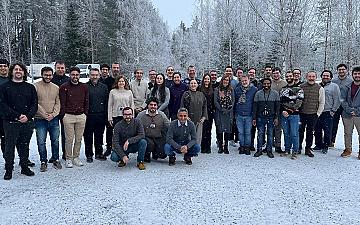In January 2020, COPKIT participated in a workshop organised by the European Commission’s Directorate General for Migration and Home Affairs (DG HOME).
The workshop brought together approx. 100 representatives of around 30 on-going projects in the area of Fighting Crime and Terrorism (FCT) research topic, funded either by the ISF-P or the H2020 programme, such as COPKIT.
The workshop was aimed at creating a forum for brainstorming on common challenges, exchange best practices, discuss possible solutions which would lead to joint outcomes and concrete actions. The workshop discussions covered legal and ethical aspects of developing and using data-driven policing technologies as well as technical ones.
The participants represented different backgrounds to share various perspectives, namely law enforcement agencies (LEAs), researchers and experts in data-driven policing, AI and ethical, legal and societal aspects. In addition to them, there were representatives of the European Commission, including representatives from several units of DG HOME, Research Executive Agency (REA), as well as Directorate General for Research and Innovation (DG RTD). Members from Europol and Interpol were represented too.
Several security projects presented their work related to the use of synthetic and real data for research purposes as well as questions related to ethics, law, data protection and societal impacts. The presentations opened up a floor for discussions and sharing experiences.
The participants discussed various issues sharing good practices and lessons learned, including such topics as:
Open and publicly available datasets relevant for security/FCT research
Principles for the use of synthetic and real data for security/FCT research
Legal bases for establishing collaboration and sharing datasets between projects
The ethical and legal framework for security/FCT research: sharing legal and ethics materials, i.e. guides, handbooks and approaches including the recently published EU report “A Preliminary Opinion on data protection and scientific research” (06/01/2020) of the European Data Protection Supervisor (EDPS).
As a result of these discussions, a number of actions were planned to tackle issues raised by the participants, namely:
Maintain an online forum for security/FCT research projects to share experiences and lessons-learnt
Maintain a list of open and publicly available datasets relevant for security/FCT research that can safely (i.e. without security, legal or ethics implications) be used by projects
Create a repository of relevant ethical and legal guides, that would be followed by an event dedicated to legal and ethics training.
Ethical, legal and societal considerations of data-driven policing tools
The COPKIT team regularly engages in the EC’s initiatives aiming at sharing good practices and lessons-learnt, particularly related to ethical, legal and data protection issues in data-driven policing projects.
Data-driven policing tools that collect and process potentially personal data may interact with the rights and freedoms of individuals, such as cybercrime victims, perpetrators or other Internet users. The COPKIT’s ELP team (involving Law and Internet Foundation from Bulgaria, University of Granada from Spain and led by Trilateral Research from Ireland) works on addressing ethical, legal, data protection and societal challenges related to the envisioned use of the COPKIT tools. Throughout the lifecycle of a project, from the early design stage to the deployment of the product or service, the ELP team conducts an integrated data protection and ethical impact assessment (E+PIA) of COPKIT technologies to achieve responsible use and innovation.
By taking an integrated and interdisciplinary approach to E+PIA in the COPKIT project, the ELP team provides their expertise and support at every stage of the project following privacy by design and ethics-by-design principles. The potential ethical, legal and societal considerations are being addressed starting from design and development activities, and we will continue during the piloting of the COPKIT tools. We work in a close cooperation with COPKIT partners and other stakeholders to understand and respond to their needs.
COPKIT’s ELP team is supported by the advisory body called the Ethical and Societal Impact Advisory Board (ESIAB) comprised of ethicists, legal experts and social scientists in order to ensure objective feedback to COPKIT’s developments.
For more information and updates, follow us on Twitter, LinkedIn and Facebook and feel free to contact our team at copkit@copkit.eu.
More information here: https://copkit.eu/joining-forces-to-tackle-the-eth...








